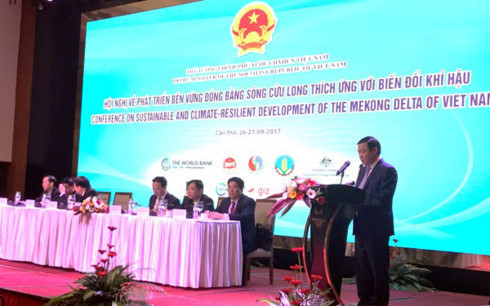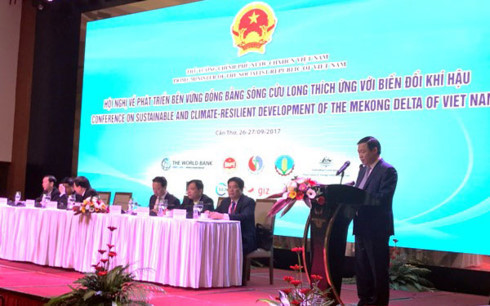



In his speech, Deputy
Prime Minister Vuong Dinh Hue urged for stronger engagement of the business
circle and people in sustainable and climate-resilient development of the
Mekong Delta.
He also called for international donors and organisations to provide technical
and financial support for the region and stressed the need to enhance the
role played by the Mekong River Commission and use Mekong River water resources
in a sustainable manner for regional prosperity.
"It is essential to fully analyse challenges presented by climate change,
the development process of the Mekong Delta and the use of water resources from
upstream Mekong River while identifying short and long-term opportunities and
forecasting major impacts on regional development.
Additionally, we should take heed to breakthrough reform policies and
mechanisms to boost the transform and sustainable development of the region
with a focus on mechanisms on land, tax, market construction, trade promotion,
science-technology and human resources development," Hue said.
The Government, localities, domestic and foreign organisations,
especially residents and enterprises in the Mekong Delta and surrounding
localities, particularly Ho Chi Minh City need to define priority projects, tasks and programmes to support
climate-resilient development of the Mekong Delta.
With one city and 12 provinces spanning a total area of 3.94
million ha and a population of 17.5 million, the Mekong Delta plays an
important role in the national economy. However, the region is one of the four
deltas hardest hit by climate change and sea level rise, the Deputy PM noted.
This is one of the deltas that have the largest agricultural
output in Southeast Asia and Vietnam, contributing 54% of rice output, 70% of
aquatic production and 36.5% of fruit amount to the country. Up to 90% of rice
exports and 65% of seafood shipments of Vietnam come from the region.
The Mekong Delta has suffered numerous severe impacts of climate
change, sea level rise and extreme weather patterns resulting in limitations in
the use of Mekong water resources, the regional development model and State
management in the region.
Such impacts have posed huge challenges and threats to the
development of the Mekong Delta, livelihoods and daily lives of people in the
delta in particular and Vietnam in general, thus adversely affecting the
development of the region and the world, particularly food security, he
said.
During the two-day conference, participants focused their
discussions on challenges, opportunities and solutions to transform the
development model of the Mekong Delta; integrated planning, infrastructure
development and regional coordination mechanism; sustainable agricultural
development, irrigation infrastructure and natural disaster response; and human
resources mobilisation and coordination.
What is achieved from
the conference will serve as a foundation for the Government to issue a
resolution on sustainable and climate-resilient development in the Mekong Delta
in the coming time.
Source: VOV